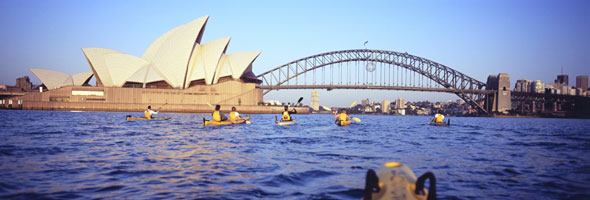
ABOUT AUSTRALIA:
Australia is located in the Southern Hemisphere. It has an area of nearly 7.7 million square kilometres. It is the world's sixth largest nation after Russia, Canada, China, the USA and Brazil.
Australia is one of the best places in the world to live while you learn. The standard of living is amongst the highest in the world, yet costs remain competitive. On your breaks from study, you will have a wide choice of activities to enrich your experience from cultural festivals, concerts and museums, to major sporting events.
Australian education has a strong international reputation for excellence. Whether you study at a university, school, vocational or English language institute, you will receive a quality education that will form a strong foundation for your future success.
The benefits of living and learning in Australia are both personal and academic. Your years in Australia will give you the best platform to succeed in your career, and prepare you for the challenges of the work place. It won’t just be your mind that develops - your time in the classroom will change you as a person.
HEALTH INSURANCE:
Your Overseas Student Health Cover (OSHC) will cover you for most medical expenses. Most large universities have a health centre on campus, and all institutions will have a first aid officer. Medical centres are in most cities and towns and are staffed by excellent doctors. Your institution will also provide you with access to counsellors who can help with mental health issues, and to family planning facilities.
CLIMATE AND SEASONS:
Almost a third of Australia is in the tropics and the rest is in a temperate zone. The coldest areas are Tasmania and the south-east corner of the mainland. Summer December to February Autumn March to May Winter June to August. Spring September to November.
Types of work for international students
International students often find work in retail, hospitality and administration. You could expect to earn $6-15 an hour, depending on the kind of work you do and your age. You may be paid more for working on Sundays or public holidays.
Tutoring younger students in the field you are studying or in your native language is also a good way to earn money. Student tutors can earn about $40 an hour.
Remember that your first priority in Australia should be your studies. If you decide to take on the challenge of part-time work, start with a few hours a week until you are able to find a balance with your studies.
VISA REQUIREMENTS:
Student visa conditions
There are a number of conditions on your visa you must follow to be allowed to study in Australia. The main conditions are that you must:
1. Maintain satisfactory attendance.
2. Achieve satisfactory academic results.
3. Continue to be enrolled in a registered course.
4. Notify your education provider of your address within seven days of arriving in Australia, and within seven days of any change in your address.
5. Notify your original educational provider if you change to a new education provider within seven days of obtaining your new certificate of enrolment.
6. Maintain OSHC cover.
There may also be special conditions for students on scholarships. Make sure you read and understand all the conditions of your scholarship to ensure you comply, or else your visa may be cancelled and you may be deported.
UNIVERSITIES:
An Australian education is a truly international experience. Our universities are linked to institutions in more than 100 countries and academic staff members are recruited from abroad. After graduating in Australia, you will be able to work in companies around the world. An Australian university will provide you with a sound understanding of your chosen field, along with academic skills that can be applied to other areas. You won’t just be learning about health, science, engineering or the arts. You’ll also be learning how to think creatively and independently.
Higher education qualifications offered in Australia
Australian universities and higher education institutions offer programs leading to Bachelor Degrees and higher qualifications in a diverse range of fields. Australian universities offer programs from Architecture to Zoology.
The Bachelor Degree is the most common qualification offered in Australia. Specialised research training and professional development is also offered through Masters Degrees and Doctoral Degrees.
Graduate Certificates and Graduate Diplomas are also available. Diplomas are becoming less common; however, the Associate Degree provides a shorter-cycle Degree program for professionals wishing to further their careers.
VOCATIONAL EDUCATION AND TRAINING:
Australia’s vocational education and training (VET) institutions offer the opportunity to hone your skills in real and simulated work environments. The practical expertise you gain in the workplace will give you a genuine advantage over other graduates.
At these institutions, you can study a wide range of disciplines, including: business and management, science and technology, design and arts, communications, sport and recreation, community service and health, tourism and hospitality, engineering and building, horticulture and land management and English.
Programs are provided by public Technical and Further Education (TAFE) Institutes, private colleges and a number of schools and universities. Industry and Government work together to develop training outcomes, which are then implemented according to nationally endorsed training packages.
This allows you to apply knowledge learnt inside the classroom, outside in the real world. You learn by doing, rather than just reading from textbooks. Your initial qualification can be built on to achieve higher qualifications, provide the basis to begin or change a career, or assist with further study at university.
You can also use this training as a pathway to other avenues of higher education. Depending on your qualification, universities may provide you with credit towards a Degree. This gives you the practical skills as well as the theory from a university Degree. You’ll leave Australia with two qualifications that are recognised around the world a major advantage over other graduates.









